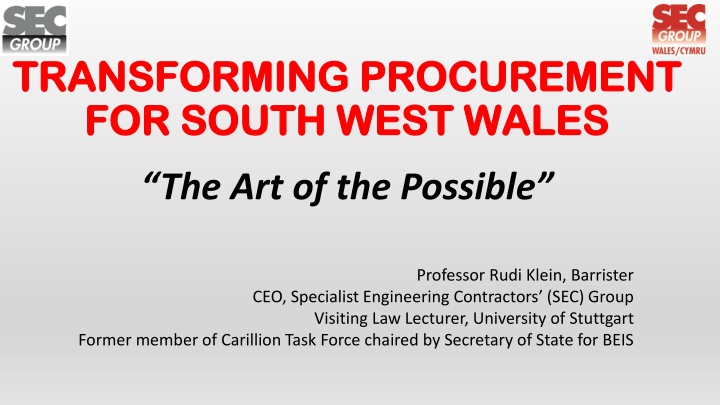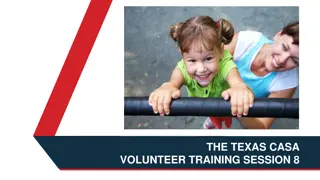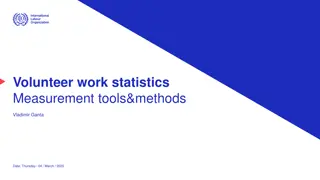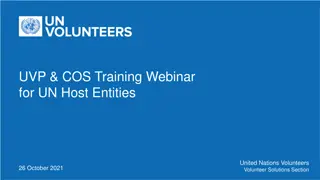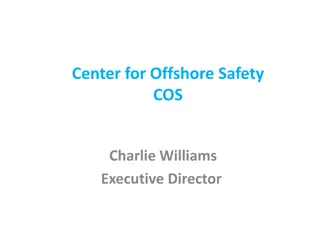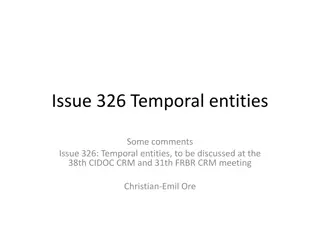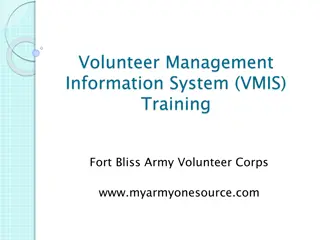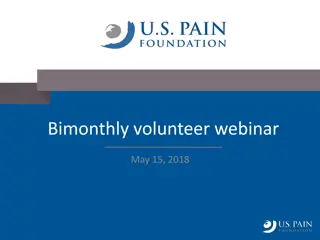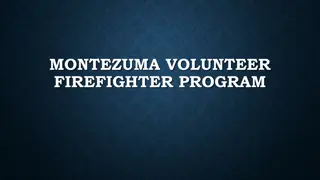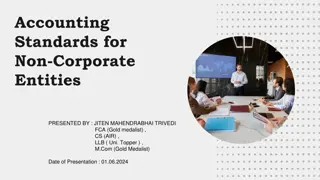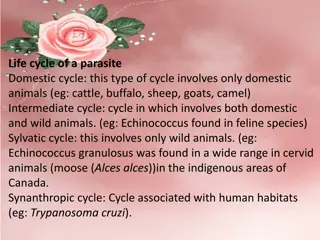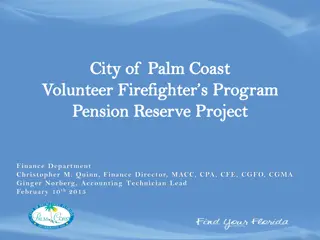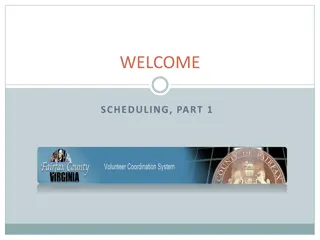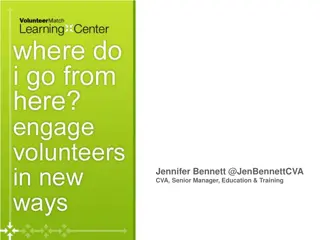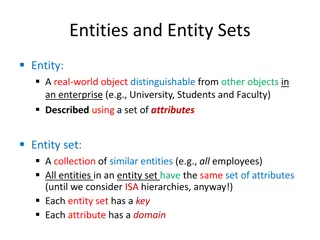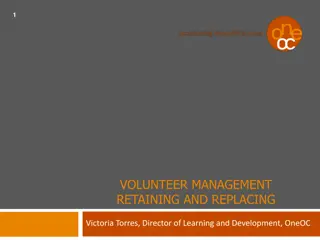UVP & COS Training Webinar for UN Host Entities - Volunteer Solutions
Join the UVP & COS Training Webinar for UN Host Entities by United Nations Volunteers on 23 September 2021. Explore the Unified Volunteering Platform, UN Volunteers Conditions of Service, and more. Learn about the transition to the new platform, host entity accounts, user roles, and features like Volunteer Management Application Modules for efficient volunteer management.
Download Presentation

Please find below an Image/Link to download the presentation.
The content on the website is provided AS IS for your information and personal use only. It may not be sold, licensed, or shared on other websites without obtaining consent from the author.If you encounter any issues during the download, it is possible that the publisher has removed the file from their server.
You are allowed to download the files provided on this website for personal or commercial use, subject to the condition that they are used lawfully. All files are the property of their respective owners.
The content on the website is provided AS IS for your information and personal use only. It may not be sold, licensed, or shared on other websites without obtaining consent from the author.
E N D
Presentation Transcript
TRANSFORMING PROCUREMENT TRANSFORMING PROCUREMENT FOR SOUTH WEST WALES FOR SOUTH WEST WALES The Art of the Possible Professor Rudi Klein, Barrister CEO, Specialist Engineering Contractors (SEC) Group Visiting Law Lecturer, University of Stuttgart Former member of Carillion Task Force chaired by Secretary of State for BEIS
STRUCTURE OF TALK IMPACT OF CONSTRUCTION/INFRASTRUCTURE PROCUREMENT ON BUSINESS & ECONOMY IN WALES. WHAT CAN BE DONE TO IMPROVE CONSTRUCTION/ INFRASTRUCTURE PROCUREMENT? WHAT INTERVENTIONS ARE NEEDED TO FOSTER HEALTHY CONSTRUCTON SUPPLY CHAINS.
IMPACT OF CONSTRUCTION/ INFRASTRUCTURE PROCUREMENT ON BUSINESS AND ECONOMY IN WALES
CONSTRUCTION/INFRASTRUCTURE PROCUREMENT IN WALES SINCE JAN 2015 121 : Number of construction contracts awarded by Welsh public bodies. 1.94bn : Total value of Welsh public sector construction contracts. 54 :Total of contracts (worth 332m) awarded to Welsh-registered firms 44.6% of overall number. 17.1% of total value overall. Source: Trussell
PROPORTION OF CONTRACTS BY VALUE AWARDED TO WELSH REGISTERED FIRMS 2015-2019 2015 : 5.6% 2019 : 20.6%(to date) Source: Trussell
FRAMEWORKS IN WALES 128 : Number of construction frameworks created since 2015. 785 : 471 :Number of Welsh-registered suppliers (60% of total number of suppliers across all frameworks). Number of suppliers. NB. Being on a framework does not guarantee work or a certain value of work. Source: Trussell
A POSSIBLE ANOMALY Period 2015-19 shows an increase in contracts won by Welsh firms Increase in number of contractors in Wales from 2011 to 2018 was +16% but +24% in rest of GB according to ONS. NB. Even if a contract is awarded to a Welsh contractor, the contractor may award its sub-contracts to non-Welsh contractors.
WHAT CAN BE DONE TO IMPROVE CONSTRUCTION/ INFRASTRUCTURE PROCUREMENT?
.the so called building team. As teams go it really is rather peculiar, not at all like a cricket eleven, more like a scratch bunch consisting of one batsman, one goalkeeper, a pole-vaulter and a polo player. Normally brought together for a single enterprise, each member has different objectives, training and techniques and different rules. The relationship is unstable, even unreliable, with very little functional cohesion and no loyalty to a common end beyond that of coming through unscathed. Professor Denys Hinton, 1975
15+ REPORTS ON CONSTRUCTION IN THE 2 YEARS FROM OCTOBER 2016 Farmer Review of the Construction Industry Modernise or Die (BEIS, Oct 2016) Report of the Independent Inquiry into the Construction of Edinburgh Schools (Feb. 2017) What s wrong with infrastructure decision making? (conclusions from six UK case studies, pub. by Institute for Government in 2017) Retentions in the Construction Industry (Pye Tait report, Oct 2017) Project 13 Blueprint by the Infrastructure Client Group and Institution of Civil Engineers (May 2018)
Reports from the BEIS Select Committee (jointly with Work and Pensions Select Committee), Public Accounts Committee, Public Administration and Constitutional Affairs Committeeand the National Audit Office. Report of the Independent Inquiry into the Construction of the DG One Complex in Dumfries (April 2018) Independent Review of Building Regulations and Fire Safety (Dame Judith Hackitt, May 2018) Procuring for Value (BEIS/Construction Leadership Council, July 2018) Construction Sector Deal (BEIS, July 2018) Off-site manufacture for construction: building for change (House of Lords, Science & Technology Committee, July 2018)
AND THIS IS WHAT THEY SAID the lowest price rules; traditional construction delivery process is highly fragmented and costly; lack of any/any effective risk management; no effective auditing of delivery processes; lack of clear accountability and responsibility; no reliable means of assessing individual/corporate technical competence; bullying of supply chains and widespread payment abuse.
Clients will form a procurement policy that uses ethical sourcing, enables best value to be achieved and encourages the early involvement of the supply chain. Integrated project teams will be used to work together to achieve the best possible solution in terms of design, buildability, environmental performance and sustainable development. Construction Procurement Strategy 2012 (published by the Construction Procurement Strategy Steering Group comprising representatives from Welsh Government, Constructing Excellence Wales and Welsh construction industry representatives).
SIX POSSIBLE OPTIONS FOR IMPROVING PROCUREMENT STRATEGIES Separate and direct engagement of some of the major supply chain inputs (e.g. MEP, steel, cladding, lifts, temporary works). Greater integration of delivery team through insurance-backing alliancing. Project risk registers subscribed to by whole of team. Breaking up of larger contracts, wherever possible into smaller packages. Standardising procurement practices and procedures. Encouraging those benefiting from public sector contracts to support employment and training in deprived communities.
INSURANCE-BACKED ALLIANCING Client appoints alliance of consultants, contractors and specialists as partners to jointly develop solution to meet the brief within a stipulated investment target . Selection and award process comply with EU law - based on capability and track record of organisations (and specific project staff to deliver project cost-effectively and to time and quality). Throughout selection/design/delivery an independent facilitator and technical/financial risk assurers monitor alliance s conduct, performance and risk management. Alliance board has oversight of project and appoints an alliance manager.
Under alliance contract all agree a no blame/no claim protocol (binding except in case of wilful default). When alliance completed sufficient design to confirm a target cost (within the investment target) the independent facilitator and risk assurers prepare a report on whether parties are working collaboratively and whether solution/target cost makes adequate allowance for risk. If report favourable client can instruct alliance to proceed to deliver project; report goes to insurers which activate the Integrated Project Insurance (IPI) policy.
IPI policy insures client, alliance partners and all the supply chain collectively against normal construction risks, public liability, cost overrun and latent defects for 12 years. Cost overrun element is unique in this respect the policy is a financial loss (not a liability) policy. Parties incentivised by gain/pain-share arrangement (the pain share being the excess on the policy).
Completion achieved when, on advice of independent technical assurers, the alliance board has confirmed project as delivered is fit for purpose defined in the brief. Cost of the IPI (including the independent facilitation and risk assurance) is between 2% and 3% of overall project cost (this has to be compared with the cost of the multiple policies taken out currently by all project participants).
INSURANCE-BACKED ALLIANCING: HISTORY Endorsed in 2011 UK Government Construction Strategy. Guidance published by Cabinet Office in 2014. After some abortive starts the 12m further education facility Advance II was volunteered by Dudley College as first trial project.
Project delivered on time for 2017 autumn academic term with 6 % savings; a Performance Certificate A and no defects. Another pilot underway is the 15m refurbishment of the Silk Mill Museum in Derby. Dudley has offered another pilot a 25m new institute of technology. Eventual aim is to achieve savings of up to 20%.
WHAT INTERVENTIONS ARE NEEDED TO FOSTER HEALTHY CONSTRUCTION SUPPLY CHAINS?
SMEs IN WALES 99% of construction firms in Wales are SMEs. 96% employ less than 13 people. Source: ONS (2018 construction statistics). Welsh Government s policy is to use public procurement to encourage Welsh SME participation (see Opening Doors, the Charter for SME Friendly Procurement published by Value Wales over 10 years ago).
POOR PAYMENT PRACTICES DAMAGE QUALITY Payment terms within contracts (for example, retentions) can drive poor behaviours, by putting financial strain into the supply chain. For example, non-payment of invoices and consequent cash flow issues can cause subcontractors to substitute materials purely on price rather than value for money or suitability for purpose. Dame Judith Hackitt s report, Building a Safer Future, para. 9.11, May 2018.
PAYMENT SECURITY Project bank accounts. If retentions deducted they must be ring-fenced. Monitoring of payment performance to ensure supply chain payments discharged within less than 30 days.
FURTHER MEASURES TO SUPPORT SMEs IN THE SUPPLY CHAIN Development and enforcement of code of ethical behaviours for procurers and supply chains (complementing the Code of Practice, Ethical Employment in Supply Chains published by Welsh Government over 2 years ago). Standard pre-qualification processes to apply throughout supply chain. Drive technical competence through insistence on use of firms accreditated for their competence under reputable and recognised schemes. Procurers should mandate use of standard sub-contracts and ban use of tier 1 bespoke contracts. Standard limitation of liability clause.
TRANSFORMING PROCUREMENT TRANSFORMING PROCUREMENT FOR SOUTH WEST WALES FOR SOUTH WEST WALES The Art of the Possible Professor Rudi Klein, Barrister CEO, Specialist Engineering Contractors (SEC) Group Visiting Law Lecturer, University of Stuttgart Former member of Carillion Task Force chaired by Secretary of State for BEIS
